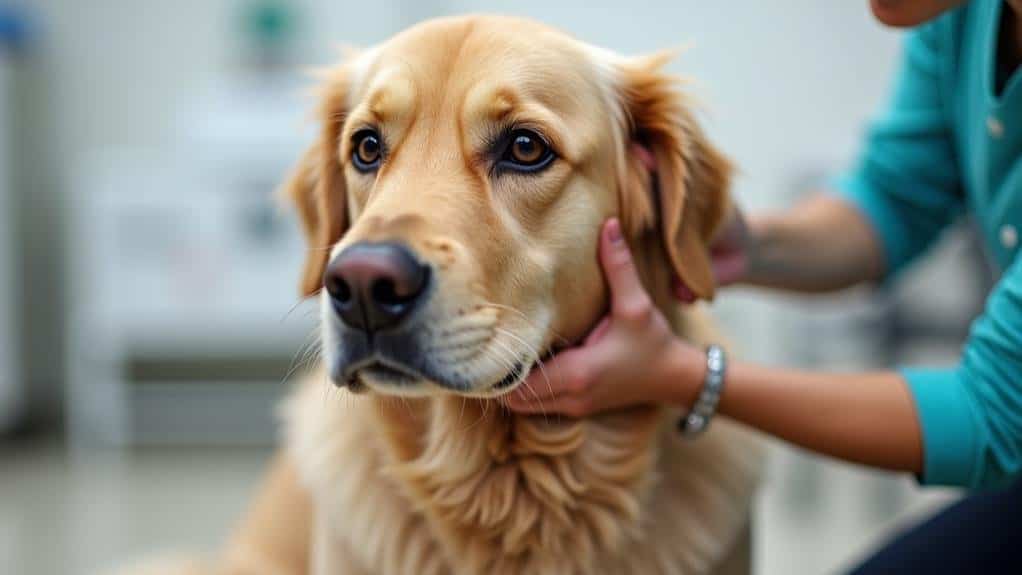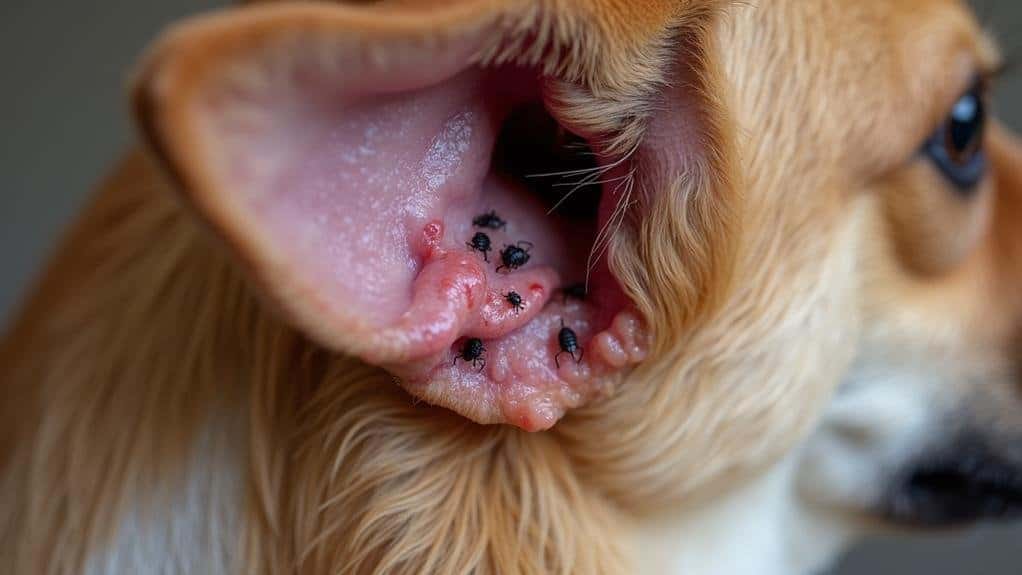Your dog's swollen ear can be caused by several factors, including ear infections, allergic reactions, trauma, or parasites like ear mites. Look for signs such as redness, warmth, discharge, or behavioral changes like excessive scratching or head shaking. Ear infections, often due to bacteria or yeast, are common culprits, especially in dogs that swim frequently. Allergies can also trigger inflammation and lead to infections. If you notice swelling accompanied by pain, foul odor, or discharge, consult your vet within five days. Regular ear inspections and proper cleaning can help prevent issues, but understanding the underlying causes is key to maintaining your dog's ear health.
Common Causes of Ear Swelling
A dog's floppy ears can be a telltale sign of health issues when they become swollen. One of the most common causes of ear swelling in dogs is an ear infection. These infections can be triggered by bacteria, yeast, or ear mites, often accompanied by unpleasant odors and increased head shaking.
Allergic reactions are another frequent culprit. Your dog may develop swelling in response to food, environmental factors, or chemicals. These allergies can lead to inflammation and potentially result in secondary infections if left untreated.
Trauma or injury from rough play or accidental bumps can also cause ear swelling. Additionally, foreign objects lodged in the ear canal may lead to discomfort and swelling, requiring veterinary intervention to remove the obstruction.
One notable cause of ear swelling in dogs is an aural hematoma. This blood-filled swelling occurs when blood vessels rupture due to excessive head shaking or scratching. If you notice a sudden, soft swelling in your dog's ear flap, it's likely an aural hematoma.
Understanding these common causes of ear swelling can help you identify potential issues early and seek appropriate veterinary care for your furry friend.
Recognizing Symptoms

Keeping a watchful eye on your dog's ears can help you spot swelling early. When examining your pet's ears, you'll notice visible signs like redness, warmth, and increased sensitivity when touched. These symptoms often indicate inflammation or potential infection.
If you detect a foul odor coming from your dog's ear, it's a strong indication of an underlying infection accompanying the swelling. You'll likely observe your dog excessively scratching at their ears or shaking their head, signaling discomfort associated with the swollen ear.
Pay attention to your dog's balance and posture. If you notice a head tilt or unsteady movement, it could be related to ear problems affecting their equilibrium.
Another critical symptom to watch for is discharge from the ear, which may be clear or discolored. The presence of discharge, along with swelling, necessitates immediate veterinary attention.
Ear Infections Explained

Ear infections are a common culprit behind dog ear swelling. These infections typically occur when bacteria or yeast overgrow in your dog's ear canal, causing inflammation and discomfort. If you notice your dog's ear flap is swollen, it's vital to take into account ear infections as a potential underlying cause.
You'll often observe other symptoms alongside the swelling, such as redness, discharge, and a foul odor emanating from the affected ear. Your dog may also exhibit increased scratching or head shaking, indicating irritation.
Yeast infections are particularly prevalent in dogs that swim frequently, as the moist environment in their ears promotes fungal growth.
To properly diagnose and treat an ear infection, you should seek veterinary care. Your vet will examine the ear canal and may take samples to identify the specific cause. Treatment often involves antifungal or antibacterial medications, depending on the type of infection.
To prevent future ear infections, especially in dogs prone to ear problems, it's imperative to implement regular ear cleaning and monitoring. By staying vigilant and addressing any signs of infection promptly, you can help keep your dog's ears healthy and comfortable.
Allergies and Ear Inflammation

While often overlooked, allergies can be a significant contributor to ear swelling in dogs. Your furry friend's allergic reactions can trigger inflammation in their ears, leading to redness, swelling, and discomfort.
Common allergens include food ingredients, environmental factors like pollen, and chemicals found in household products. If you notice your dog excessively scratching or shaking their head, it's vital to take into account allergies as a potential cause of their ear problems.
When allergies are the culprit, your dog's immune system overreacts, causing inflammation in affected areas, including the ears. This swelling can make your pet uncomfortable and may lead to secondary infections if left untreated.
To help manage and prevent ear inflammation caused by allergies:
- Monitor your dog's environment for potential allergens
- Keep a food diary to identify possible dietary triggers
- Regularly clean your dog's ears to prevent irritation
If you suspect allergies are causing your dog's swollen ears, it's important to consult your vet. They can help identify specific allergens and recommend appropriate treatments to alleviate your dog's discomfort and prevent further ear problems.
Trauma and Foreign Objects

Dogs can experience ear swelling due to trauma or foreign objects, which often result from everyday activities or environmental factors.
Your dog's ear flap can become swollen from rough play, accidents, or even vigorous head shaking. These incidents can cause trauma to the delicate ear tissues, leading to pain and inflammation.
Foreign objects, like grass seeds or small debris, can also find their way into your dog's ear, causing irritation and swelling. If your pet is scratching excessively or shaking its head more than usual, it might be trying to dislodge something stuck in its ear.
Watch for signs of ear swelling, redness, or discomfort when touching your dog's ear. These symptoms could indicate trauma or the presence of a foreign object.
Don't delay in seeking veterinary care if you notice these signs. Prompt examination is essential to prevent complications and guarantee proper treatment.
Ear Mites and Parasites

A common yet troublesome cause of ear swelling in dogs is ear mites and other parasites. These microscopic creatures thrive in the warm, dark environment of your dog's ear canal, causing significant irritation and discomfort.
If you notice your dog excessively scratching their ears or shaking their head, it's time to investigate further.
Ear mites can lead to several noticeable symptoms:
- Excessive wax production in the ears
- Dark, foul-smelling discharge
- Visible ear swelling and redness
While puppies are more susceptible to ear mites, any dog can contract them through close contact with infected animals.
Left untreated, these parasites can cause secondary infections, exacerbating the ear swelling and discomfort your dog experiences.
If you suspect your dog has ear mites, it's essential to consult your veterinarian promptly.
They'll likely prescribe topical insecticides and thoroughly clean your dog's ears.
In cases where infection has set in, additional medications may be necessary.
When to Consult a Veterinarian

Most dog owners face uncertainty when deciding whether their pet's ear swelling requires veterinary attention. However, it's vital to consult a veterinarian within five days of noticing any aural swelling to prevent potential complications.
Don't wait if you observe signs like redness, discharge, foul odor, or excessive scratching, as these indicate the need for professional care.
Prompt veterinary attention is essential for accurate diagnosis and treatment, especially if the swelling is accompanied by head shaking or tilting. If your dog shows signs of pain or discomfort when you touch the affected ear, schedule an appointment immediately, as this may signal a more serious problem.
Dogs with recurrent ear issues may require ongoing veterinary evaluation to address underlying conditions and prevent future occurrences.
By seeking timely care, you're ensuring your pet's comfort and preventing potential long-term health issues. Remember, it's always better to err on the side of caution when it comes to your dog's ear health.
Your veterinarian can provide the necessary expertise to diagnose and treat the underlying cause of the swelling, offering your furry friend relief and preventing further complications.
Prevention and Home Care

Over time, proactive care can considerably reduce the risk of ear swelling in dogs. Regular ear inspections are essential for catching potential issues early. Look for signs of redness, swelling, or discharge, and don't hesitate to clean your dog's ears using vet-recommended solutions. Avoid deep insertion to prevent damage, and always keep your dog's ears dry, especially after baths or swimming.
Monitor your dog's diet and environment for allergens that could trigger ear inflammation. If you suspect allergies, consult your vet for proper management strategies. For dogs prone to ear problems, schedule routine check-ups to guarantee timely prevention of chronic conditions.
Here are some key prevention tips:
- Use cotton balls to block moisture during baths and dry ears thoroughly afterward
- Clean ears regularly with veterinarian-approved solutions
- Schedule routine vet appointments online for proactive ear health monitoring
Frequently Asked Questions
How Do You Treat a Dog's Swollen Ear?
To treat your dog's swollen ear, first consult a vet to identify the cause. They'll likely prescribe medication, recommend ear cleaning, or suggest drainage for hematomas. Follow their instructions carefully and attend follow-up appointments for the best outcome.
Why Is My Dog's Ear Puffy Like a Balloon?
Your dog's ear is likely puffy like a balloon due to an aural hematoma. It's a blood-filled swelling caused by ruptured blood vessels. This often results from your dog shaking its head or scratching excessively. Seek veterinary care promptly.
Will a Dog's Ear Hematoma Heal on Its Own?
Your dog's ear hematoma likely won't heal on its own. Without treatment, it can lead to permanent deformities. While small hematomas might resolve, it's best to consult a vet for proper drainage and to prevent complications.
How Do I Know When to Take My Dog to the Vet for an Ear Infection?
You should take your dog to the vet if you notice excessive scratching, head shaking, or ear discomfort. Watch for foul odors, discharge, redness, or swelling. If symptoms persist for more than five days, it's time to seek professional help.
Conclusion
You've learned about the various causes of your dog's swollen ear, from infections to allergies and injuries. Remember to watch for symptoms and act quickly if you notice any unusual changes. While some minor issues can be managed at home, don't hesitate to consult your vet if the swelling persists or worsens. By staying vigilant and providing proper care, you'll help keep your furry friend's ears healthy and comfortable.

